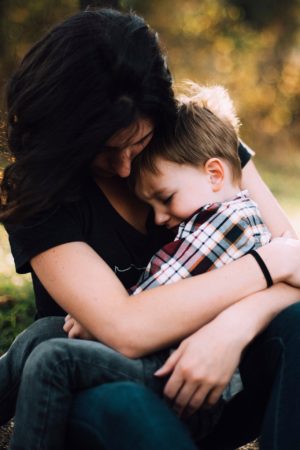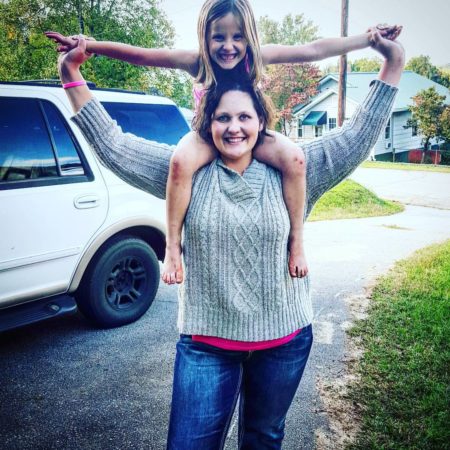 Every individual working with abused or neglected children has a moment when their core belief in humanity is shaken. Children are vulnerable and innocent, and it is a basic human instinct to protect them, to keep them from the evil that is ever present in this world. Unfortunately, there are many who prey on this innocence. Even more devastating is the realization that the abuse often comes from those who are supposed to love and care about the children the most.
Every individual working with abused or neglected children has a moment when their core belief in humanity is shaken. Children are vulnerable and innocent, and it is a basic human instinct to protect them, to keep them from the evil that is ever present in this world. Unfortunately, there are many who prey on this innocence. Even more devastating is the realization that the abuse often comes from those who are supposed to love and care about the children the most.
I had not been working at Miracle Hill very long when I experienced my first heartbreaking case. Elijah was a tough kid. He wasn’t the sweet, mild-mannered young man that makes for a heartwarming story. He often yelled at his house parents and would instigate conflict with his peers. He presented himself as a “bad boy” not needing affection or love from anyone. Elijah was like many children who come into foster care. Elijah had a tendency to draw all over his arms and his legs with dark permanent marker. Despite being told that this behavior was not good for him, Elijah would seek out pens and markers to cover himself with graffiti. As a young worker, I was perplexed by this behavior.
Scars Revealed
A few days after arriving at Miracle Hill, Elijah had his first doctor’s appointment. I picked him up and quietly drove to the pediatrician’s office; Elijah was not one for conversation. After being shown back to the room, the pediatrician walked in. He was a wise man who had worked with abused children for many years. He took a look at Elijah’s arms and legs. He then said, “You know I have to see them.” Somewhat confused, I watched him slowly take an alcohol pad from the drawer and open it. As I watched, I was horrified as he removed the ink from the child’s arm. Under the markings were a series of long striped scars. The doctor then asked Elijah, “Are they only on your arms and legs?” Without words, Elijah shook his head no; he jumped down from the table and lifted his t-shirt. His back was covered with banded scars, to the likes of something I had only witnessed on television. Fighting back tears, I sat calm trying to hide my alarm.
The doctor asked Elijah, “Tell me, son, how exactly did this happen?” Elijah started to tell in explicit detail the stories of being whipped with an extension cord, not once or twice but for as long as “he could remember”. In the midst of his story, Elijah appeared to be pleading for us to understand why he in fact deserved his punishment. He stated, “My dad only does it when I act up.” He then proceeded to tell the doctor that he drew over the marks because he didn’t want his friends at school to see the scars. With his calm demeanor the doctor put his hand on the boy’s shoulder and said, “You know, Elijah, nothing you could ever do would make you deserve this. It’s not your fault and you are safe now.” Elijah’s eyes welled up with tears, he dropped his head, and from his quiet sniffles he replied, “I know”. After that day, Elijah still had challenging behaviors. He tested staff’s claim to care about him; he also continued to draw on himself for several months. However, reluctantly he started to bond. As he grew, he took pride in his school accomplishments and developed a sense of self that was separate from the horrors of his past.
A Strong but Soft Heart
When coming to Miracle Hill God called me to a simple prayer: “Dear Lord, please allow my heart to stay strong but soft.” I remember the tears I shed for Elijah that day after I returned to my office. I did not know at first why God had given me such a prayer, but God revealed it to me this day. He needed me to stay strong. He needed me to be able to bear hundreds of more stories like Elijah’s. Moreover, he was also calling me to not become callous. God put a burden on my heart to pray for Elijah’s dad that afternoon, a prayer that was difficult to utter at first, but became easier with time. Even though Elijah never returned to the care of his father, many children are reunified with their parents each year.
At the Children’s Home we don’t only seek healing for our precious children but also for the families of the children we serve. Serving the whole family, we offer resources and support to parents as well as the children. Trauma is devastating, but unfortunately it is also often generational. Connecting with the family, helping to stop the cycle of abuse, becomes an extremely important goal.
Abuse – Just how common?
Childhood is the foundation that often shapes the direction of an individual’s life. Children should be nurtured, protected, and taught. Unfortunately, too often a child is charged with the task of growing up in the midst of their childhood. I came to work at Miracle Hill Children’s Home in March of 2014. Working with abused and neglected children has shown me just how much wickedness exists in this world. This abuse leaves our children physically scared, developmentally delayed, educationally off track, and too often feeling worthless.
Regrettably, it’s not only our children who experience abuse. According to the US Children’s Bureau almost 700,000 children are found to be abused or neglected each year –each of these children with a story similar to Elijah’s. Of these children, 75% are victims of neglect, 17% are physically abused, and 8% report being sexually abused. Organizations like Miracle Hill and the South Carolina Department of Social Services work to keep these children safe. However, tragically, at times it is not enough, leading to about 1,700 child abuse deaths each year.
At Miracle Hill we serve approximately 225 children in our children’s shelters and another 418 in foster homes each year. These children come to us with various needs. Many have been victims of extreme trauma, having experienced a lack of basic resources, been beat or violated. Once a child is referred to Miracle Hill, staff and foster parents slowly begin the process of helping picking up the pieces of the abuse. The children are given security and love. They are offered opportunities to grow and to just enjoy being a child.
Hope, Restoration, Resilience
One cannot paint the picture of childhood abuse without explaining the hope that is also available. Psalm 34:18 reads, “The Lord is close to the brokenhearted and saves those who are crushed in spirit.” God offers healing and love to these children through the foster parents and staff that serve each day. God allows us to remain strong but also calls us to walk through the pain with each child we serve.
 When I describe trauma, I often use the image of a broken cup or vase. There are times when the vase may only be chipped. When this happens, all that is needed is a little glue to fit the pieces right back together. However, other times it may be as if the vase has shattered, with pieces so broken that restoration seems hopeless. Resilience and hope come in seeing the potential in these broken pieces. God offers complete restoration, not in fitting everything back together, but in reassembling a brand new piece of art. Many trauma survivors find beauty in the mosaic that God assembles as he brings hope and healing into their lives.
When I describe trauma, I often use the image of a broken cup or vase. There are times when the vase may only be chipped. When this happens, all that is needed is a little glue to fit the pieces right back together. However, other times it may be as if the vase has shattered, with pieces so broken that restoration seems hopeless. Resilience and hope come in seeing the potential in these broken pieces. God offers complete restoration, not in fitting everything back together, but in reassembling a brand new piece of art. Many trauma survivors find beauty in the mosaic that God assembles as he brings hope and healing into their lives.
Be encouraged – there is hope. Not only for the children and families we serve, but to all. There is no heart, life or family that is beyond God’s reach. Thank you to those who support Miracle Hill and make sharing this hope possible. We ask that you continue to cover our foster parents and houseparents in prayer as well as the children we serve.
“Childhood should be carefree, playing in the sun; not living a nightmare in the darkness of the soul.”
― Dave Pelzer, A Child Called “It”

Rose Tapp-Scruggs with her daughter
Blog post submitted by Rose Tapp-Scruggs, Program Manager at Miracle Hill Children’s Home. Rose can be reached at rtapp@miraclehill.org






